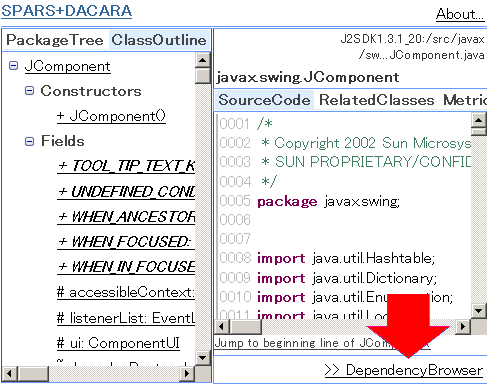 SPARS PROJECT
SPARS PROJECT
We are currently developing a software archive system called
SPARS(Software Product Archive, analysis and Retrieval System).
As you would imagine, many software engineers have been developed a
large volume of program codes for more than 30 years. Very similar
codes might have been independently developed at various places in the
world or various situations in the history, without knowing other
developers activities.
There are a lot of technologies proposed for efficient reuse of
program codes and components, but those technologies are scarcely
used in current development environment.
SPARS contains a large collection of source codes of various software
systems, and it provides a very powerful search engine for pieces of
codes or software components.
The system includes the following.
- Collection engine of various source codes
- Repository of source codes
- Fast classification and clustering engine of source code components
- Ranking engine of the components based on Component Rank method
- Query engine for the code searcher
 DACARA
DACARA
Developers can obtain each component using SPARS. However, many
related components are sometimes required for using single
component. DACARA, a new extension for SPARS/R, provides a set of
ready-to-reuse components at once.

DACARA provides multiple sets of components which have consistent
interfaces. Users of DACARA choose one from the sets according
to their preference.
 Demonstration
Demonstration
Our demonstration website has been closed.
SPARS/R:
http://demo.spars.info/r/
The old SPARS (SPARS-J):
http://demo.spars.info/j/
 Technical Report
Technical Report
- "Component Rank: Relative Significance Rank for Software Component Search",
IEEE Transactions on Software Engineering, Vol.31, No.3, pp.213-225
- "Ranking Significance of Software Components Based on Use Relations",
Proceedings of the 25th International Conference on Software Engineering(ICSE2003),
pp14-24, Portland, Oregon, U.S.A., May 6-8, 2003. Also, Technical Report of SE Lab, Dept. of Computer Science, Osaka University, SEL-Oct-8-2002, Oct. 2002.
See our publications for the detail.
This project was supported by ACT-JST (Research and Development for
Applying Advanced Computational Science and Technology)
since November 2001 to Novermber 30, 2004.


 SPARS PROJECT
SPARS PROJECT DACARA
DACARA
 Demonstration
Demonstration Technical Report
Technical Report